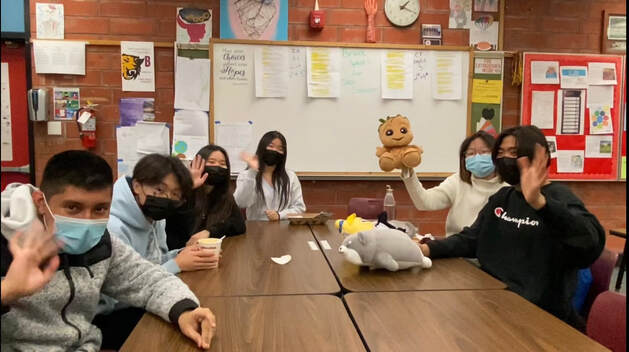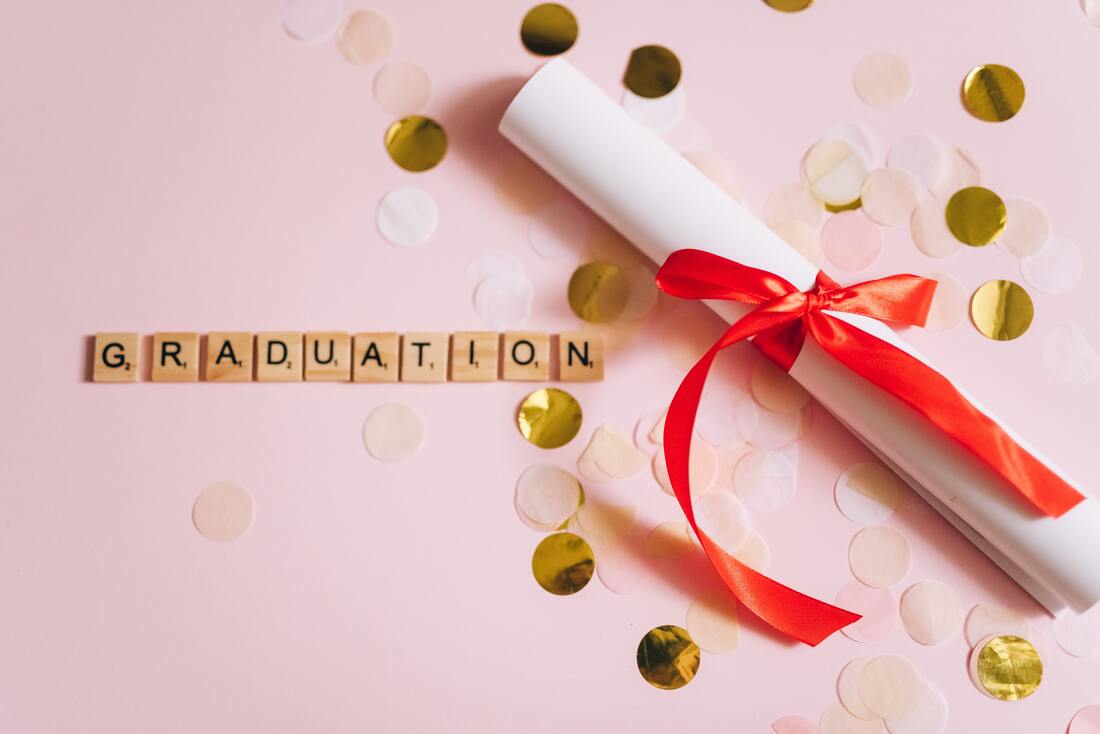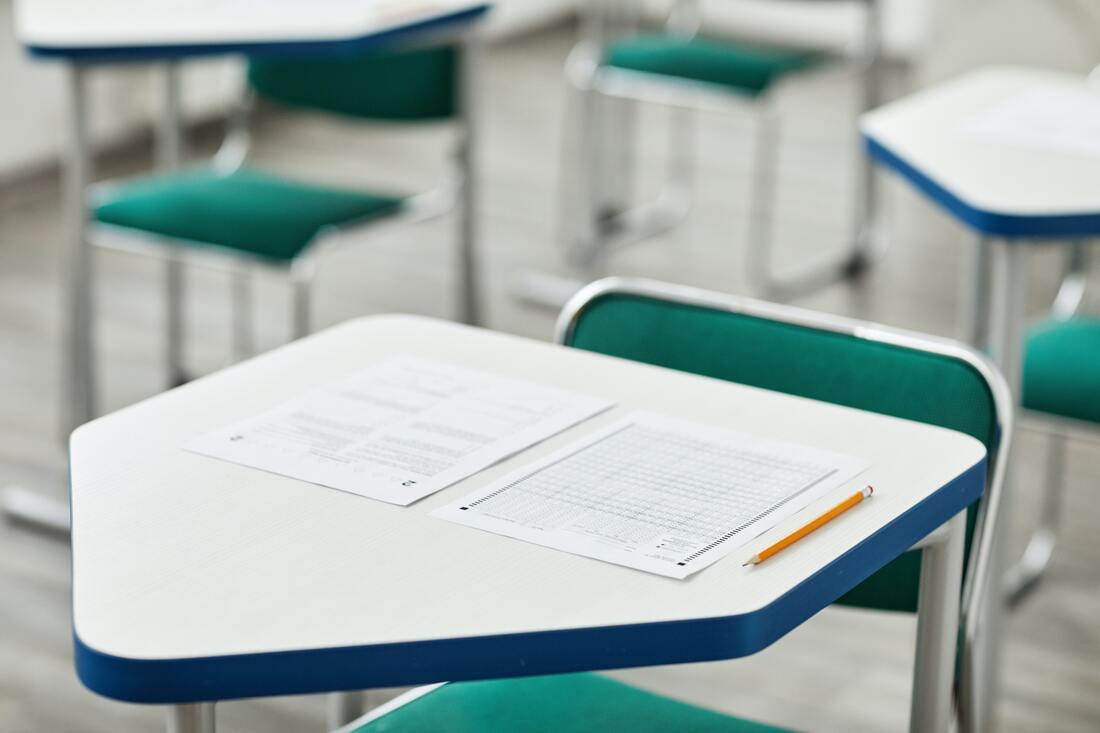|
Today we have something very special! We had the opportunity to speak with some of our IB Certificate classmates here at Wilson and hear what their perspectives were regarding the IB Certificate option and their IB classes. A big thank you to Derrick, Emily, Avery, Emma, Brian, and Ivan for participating in our interview! I know we learned a lot from hearing your insightful responses and opinions. It was also just a great time to be there with you guys!
Our special guests come from a variety of IB courses, including IB HL Literature, IB Theatre SL, and IB Math Applications and Interpretations SL. We'll have more content coming out on these specific classes and others soon! Stay turned for more interviews and discussions like this one! Hope you enjoy! I also wanted to say a special thank you to Angelo for helping me organize and facilitate this discussion and to Ms. Rouw for her support with this!
0 Comments
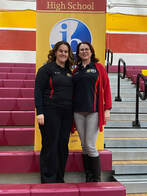 Pictured from left to right, Ms. Casey and Ms. Rouw! Pictured from left to right, Ms. Casey and Ms. Rouw! Yesterday, January 17, 2023 was the open house at Glen A. Wilson High School! The IB Program had quite the presence at the event, with a table toward the front entry of the event. IB Coordinator Ms. Rouw and Extended Essay Coordinator/TOK Teacher Ms. Casey prepared a very organized booth, with informational papers about IB coursework and the benefits of the program. We also distributed information flyers announcing IB 8th grade parent night, which is taking place at 6:30 in the media center. There, Ms. Rouw will be answering more questions and you'll have the opportunity to hear the experiences of current IB students! 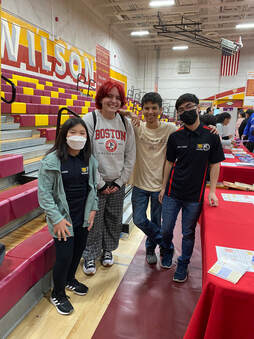 From left to right, Canon, Melissa, Alex, and Angelo! From left to right, Canon, Melissa, Alex, and Angelo! We, as students, also had the opportunity to share our own experiences with prospective students and their parents at open house to help them learn more about what we do and why IB is a great decision! Our fellow writer and IB Diploma Junior Angelo did a commendable job representing the program and sharing the experiences he's had so far. You've still got many more memories to make, Angelo: may the next three semesters treat you well! One of the biggest honors of the night was reuniting with two Class of 2022 IB Diploma graduates, Alex and Melissa! It was a pleasure to hear them speak about their experiences in college. Alex reports that his professors have been using his papers as the standard to strive for, and Melissa has started university with already 24 credits! Having the opportunity to work with these team of my IB classmates was incredible! I've learned so much about being a community and the good that a program such as IB can do! By Canon Pham Canon Pham is an IB Diploma Candidate and Junior at Glen A. Wilson High School who is passionate about using her voice to raise awareness of important issues and build community among like-minded people. After her first semester of Junior year, she started the IB Student Chronicle to help provide more information about the IB experience for prospective and first-year IB Diploma Candidates. She also writes for The Teen Magazine, tutors with Reading Partners, holds several leadership positions at school, and plays varsity tennis. Canon enjoys spending time with her two younger siblings, her adorable puppy dog, and her incredible group of friends. 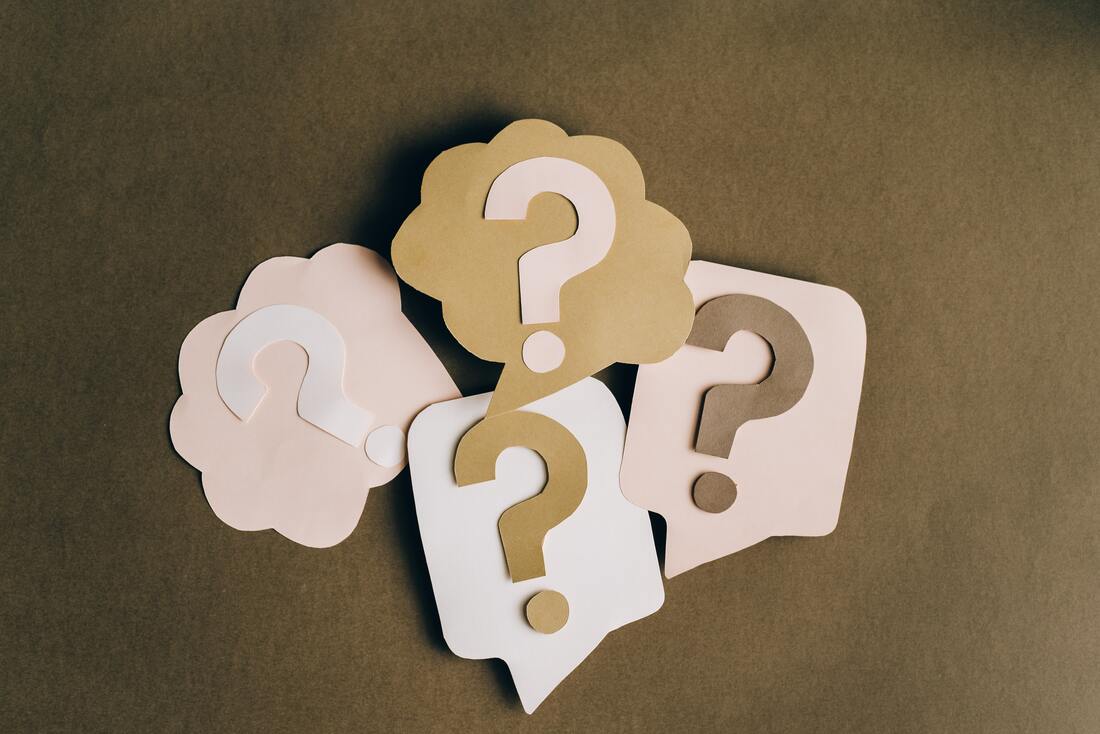 Welcome back to the IB Student Chronicle, and today we're going to discuss some of the most frequently questions that students tend to ask about IB! If you have any questions you'd like us to address, please leave us a comment in our posts and we will respond as quickly as possible. Do you need to have a certain GPA or class rank to be considered for the IB Diploma Program? This is a common misconception, but there is no required GPA or class rank for IB! You don't need to be in the top 10% or even the top 25% of your class to be in the program or to apply! All you need to do is either submit an application in your 8th-grade year or let your teacher or IB coordinator know you're interested in the program and you'll be considered! Your academic record should never be a barrier to your participation in the program. Can you do IB Diploma and be in sports? Yes, you can most definitely be in the IB Diploma Programme and do sports at the same time! For example, I'm in the IB Diploma Programme and also just finished my fourth year on the tennis team at my school. One of my very close friends is also in IB Diploma is captain of the basketball team, too! You can definitely do both, but just make sure you manage your time and find support from your teachers and classmates. Are there significant benefits to doing IB Diploma? The IB Program definitely has many benefits! You'll become close with your fellow IB Diploma students and have much experience with college-level writing and research (see our articles about the Internal Assessment and the Extended Essay for more information about this). These are skills that will pay off in dividends in the future, no matter what your post-secondary plan is! I would highly recommend IB for these reasons :) Hopefully this article has answered some of the questions you have about the IB Diploma Programme! We plan to put out more answers to questions that we frequently hear about IB so that we can provide as much information as possible and clarify misconceptions. By Canon Pham Canon Pham is an IB Diploma Candidate and Senior at Glen A. Wilson High School who is passionate about using her voice to raise awareness of important issues and build community among like-minded people. After her first semester of Junior year, she started the IB Student Chronicle to help provide more information about the IB experience for prospective and first-year IB Diploma Candidates. She also writes for The Teen Magazine, tutors with Reading Partners, holds several leadership positions at school, and plays varsity tennis. Canon enjoys spending time with her two younger siblings, her adorable puppy dog, and her incredible group of friends. 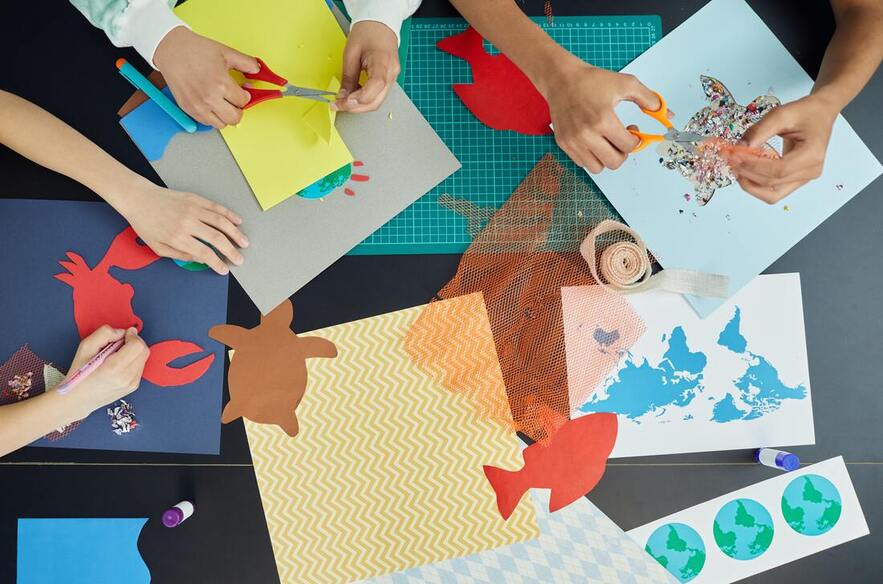 For Diploma students, you may have heard the term CAS Project before in discussions about CAS. But what exactly is this project and what is required? Today we'll be diving into how to tackle the CAS project, how to plan, and some ideas to start with! Introducing: the CAS Project The CAS Project is a project that will be submitted as part of your CAS portfolio and have its own separate reflections. In addition, while the CAS experiences are individual, the CAS project must be completed in a group of up to 3 students. These students do not need be IB Diploma or Certificate students, so you can work with any of your classmates and friends on this! As you can see, you're allowed a great extent of freedom on this project, and inspiration can come from just about anywhere! The Basics of the Project The requirements for the CAS project are that it must be an activity that the student initiates themselves and that can be passed on to the next generation of students and last multiple years. The IB wants to see that you are actively engaged and challenging yourself while also leaving a lasting impact and legacy on your community. When reflecting on your CAS project in your CAS portfolio (Google Site), make sure that you are discussing what your project was, how it challenged you, your process in planning and organizing the project, and how it has impacted you personally. Keep in mind that these reflections don't always need to be written text, either: you can also record a video reflection or create something visual that also explains your activity or project. As long as your reflection demonstrates your process and the impact it had on you as a learner, you're golden! Examples of CAS Projects Now, you might be thinking; that sounds good and peachy, but how and where do I start? Here are some example CAS projects I've heard of that can help springboard some ideas:
Takeaways
Hopefully this article has helped you get an idea of what the CAS Project is and what is considered within the parameters of the project. If you having trouble deciding on an idea, bring it back to the three parts of CAS: Creativity, Activity, and Service. Maybe you love playing a specific instrument and you can use that to base your project on creativity, or you're an athlete and you could start a local youth tournament in your community. There are many ways to tackle this, and the possibilities are nearly endless! As long as you're not getting paid or graded for it and your project has meaning to you, go with your gut and initiate something unique! For any concerns or questions about the CAS Project, leave us a comment below and we'll respond! Also, don't forget to visit the IB Organization's guide to the CAS Project for more information. Keep an eye out for our future articles about CAS: until next time, IB family! By Canon Pham Canon Pham is an IB Diploma Candidate and Senior at Glen A. Wilson High School who is passionate about using her voice to raise awareness of important issues and build community among like-minded people. After her first semester of Junior year, she started the IB Student Chronicle to help provide more information about the IB experience for prospective and first-year IB Diploma Candidates. She also writes for The Teen Magazine, tutors with Reading Partners, holds several leadership positions at school, and plays varsity tennis. Canon enjoys spending time with her two younger siblings, her adorable puppy dog, and her incredible group of friends.  A math class can be a great thing! A math class can be a great thing! So you want to take IB Math Applications and Interpretations but have no idea what the course is about? Then, this article is for you! IB Math Applications and Interpretations or IB MAI is a Standard Level (SL) course, which fulfills Group 5 (Mathematics). It should be noted that Higher Level (HL) courses can only be offered in Year 1 via request from a student. IB MAI covers the practical usage of math in the real world, such as using statistics to predict how many of each color candy will be in a bag sold or using Pearson’s Correlation Coefficient to study relations between two variables, such as the number of cars in a given area and the carbon emissions produced. IB MAI covers five categories of math: numbers and algebra, functions, geometry and trigonometry, statistics and probability, and calculus. You will be expected to spend the majority of your time on the statistics and probability section and the least amount of time on calculus, so don’t fret over not having experience with calculus. The course requires you to have a basic understanding of all the concepts. Now that we’ve established a basis of understanding, let’s talk about my experience with IB MAI. I used to hate math. It was never my “thing” and many of my previous math teachers would tell me that I was “bad at math”. That all changed when I started IB MAI. My teacher was kind yet firm, but wholly believed in his students’ abilities to overcome the challenges presented as well as their competency overall. That which was once a dreadful subject was now some course that I aced and excelled at. The hardest sections in IB MAI, in my opinion, was the statistics and probability section, not because the content itself was necessarily challenging but because of the sheer amount of vocabulary that you had to memorize. My tips for this and any section is to use relatable situations and examples to understand the content. Additionally, take notes on what you don’t understand and don’t be afraid to ask questions in class. The second most valuable “tool” in this class besides your teacher are your peers. I would never have been able to make it through that class without the other people in my class. You’re all in the same storm together, so lean on each other. Try working problems out together or quizzing each other on certain topics. A good standard of your comprehension of the material is your ability to explain and teach others the same material. Many a time I’ve explained and taught fellow classmates how to do a problem, in which they questioned my methods, forcing me to explain which in turn allowed me to see gaps in my understanding or in my methods. On the flip side, it might affirm what you already know, solidifying and boosting your confidence in your ability. Lastly, make sure to communicate with your teacher. In my case, it was the wonderful Mr. K! He’s arguably one of the best teachers on our campus who will do his best to support you on your journey. It’s about the journey, understand? Learning how to research then effectively learning how to communicate your understanding in analysis of mathematics is the focus of this class. Do your best! Let me know if you have any questions about it! By Elizabeth Leung Elizabeth Leung is an IB Diploma Candidate and Senior at Glen A. Wilson High School who is passionate about STEM. She is the vice captain of the Science Olympiad team at school, specializing in Chemistry events, such as Chemistry Lab and Forensics. She is also a Girl Scout Ambassador 1, who plans trips and events for her troop. She enjoys drinking boba milk tea, trying new foods, and hanging out with all her friends.  After choosing your IB classes, that means you are all set to go, right? Sadly that is incorrect. After all your courses are selected, you may still run into issues with scheduling. This is what happened to me. Generally, it is a good idea to get one or two of your SL/HL tests done in your junior year. This relieves tensions off your senior year schedule and also familiarizes you with how the tests work. Though not common, some students may experience classes overlapping in their junior year, meaning you might have zero IB classes in your junior year and all your IB classes/tests senior year. If this doesn’t apply to you, you can skip this article, but if it does apply to you please continue reading as I’ll be sharing my opinions and how to stay on top of all the work coming your way. Like you, I am one of those students with this special case. Because of the overlap between my selected MAI class, I was unable to take it, which meant I had 0 IB tests my junior year. This ultimately was a bad thing as I would go into senior year with 6 IB classes and tests. What makes this even worse is that your senior year is busier than you think. Most people believe that junior year is the most difficult, and while this may be true, the first semester of senior year carries a lot of stress as well. On top of writing and submitting college applications, we IB diploma students still need to write our EEs and finish our CAS activities. So, the first step to not being overwhelmed by your senior year class load is staying on top of your EE and CAS. That means you should be taking advantage of having no IB classes junior year and getting ahead on both those activities. CAS is something you can do over time, but the EE is something one must start right away. These two will also carry over into the summer before senior year as well and since we usually take civics and econ over the summer while also participating in other extracurricular activities, it’s going to be jam-packed. Another choice you can (or should) make is studying up on the classes you will have senior year. If you know any particular class that might give you trouble, you might as well take the extra time you have now to get ahead. For me, this class is IB Chinese. Coming out of AP Chinese, I knew IB Chinese was going to be even more difficult. So over the summer, I was sure to review many foundational vocabulary terms and build up from there. Additionally, I also spent some time reviewing biology because that was difficult for me as well, and I’m sure IB Bio will be much harder. Just because you are missing an IB class junior year, does not necessarily mean you are falling behind. Instead, you should utilize this extra time to get ahead and stay on top of things. By getting a head start on your EE and CAS, as well as studying up for future classes, you can optimally use your time junior year and not get too overwhelmed senior year. One major downside is the lack of exposure to how the IB tests work. Having to take six IB exams without having taken one before may be daunting, but just know it's okay. Our amazing teachers prepare us well for the tests and other essays, projects, and assessments associated with the class. Your teachers will be your lifelines: they will help you get through this course and obtain your diploma, so no matter what the situation you are in, trust them and trust yourself. By Alex Li Alex Li is an IB Diploma Candidate and a Senior at Glen A. Wilson High School. He is highly interested in the field of politics and wishes to become a lawyer when he grows up. This passion for politics has led him down the road to be the captain of Wilson's Mock Trial team, along with other leadership roles such as Varsity Golf Captain and Vice President of Red Cross. In his free time he likes to write and publish articles to a variety of media, such as the LA Times High School Insider, and he also has entered contests as well, writing for the John F. Kennedy Profiles in Courage yearly contest. Today we have a very special treat for you on the IB Student Chronicle: we interviewed a recent IB Diploma graduate (class of 2022) from Glen A. Wilson High school, Rani! Rani is going to be attending Stanford University in the fall and has many valuable things to say about her experience in IB! We hope you enjoy hearing from Rani as much as we did! 1. How would you describe IB in three words? Friends. Intellectuals. Chaotic (in the best way) 2. What differences can an IB student expect between IB Year 1 and Year 2? Hmm, that’s a good question. Keep in mind I was online for Yr 1 and took the non-exam route — honestly, year two was much more fun because everyone in the DP program has the same classes so we got to talk to each other all day. In terms of workload: the IAs and essays were heavier in quantity so finishing them early over the summer was a very good idea. Also, this is very dependent on the teacher but as an IB student, your teachers will be much more understanding about late class assignments than, say another honors class because IB work takes priority over daily assignments. 3. What advice do you have for incoming IB students? Use YR 1 to figure out what study method/essay outline structure works for you, and work smarter not harder. 4. What was your favorite part about IB? The PEOPLE. It’s a small tight knit group of people :) 5. What is your favorite memory from your experience in the IB Diploma program? I don’t have a favorite haha — more a collection of good memories that made the Glen A. Wilson High School IB a pleasurable program. I definitely loved my IB teachers Mrs. Casey and Ms. Rouw’s YUMMY food/birthday traditions. I still have my birthday certificate that Ms. Rouw gave me earlier this year. As you can see from our past couple of articles, IB is an experience that will give you very special memories and bonds that you will cherish long after high school! A big thank you to Rani for sharing her experience: wishing you all the best on behalf of Glen A. Wilson High School's IB class of 2023, Rani! Hello! Welcome back to the IB Student Chronicle, and today we've got a special treat for you! For this article, I interviewed my fellow IB classmates to learn about their experiences throughout their first year in IB and what they're looking forward to next year! All of my classmates who I interviewed and I are part of the IB Diploma Class of 2023 at our school in California, so we just finished our Junior year! Hopefully hearing about all of our experiences will help you navigate your years in IB and give you lots to look forward to!
Savannah: What are three words you would use to describe your first year in IB Diploma? I would describe my first year in IB as being fun, rigorous, and memorable. I have enjoyed meeting new people and balancing the many classes I am taking. I thoroughly enjoyed the many activities and opportunities that IB has given me. What advice do you have for pre-IB Students and incoming IB Diploma Juniors? Some advice that I have for IB diploma students becoming juniors is to manage time wisely. Using a planner and setting reminders on my phone has been very helpful for me. This will allow you to stay on top of your schoolwork and manage extracurriculars. What is your favorite part about IB in general? My favorite part of IB Is definitely the people. I have made so many great friends through this program that share the same values as me. I love how close our cohort as gotten over the course of IB! What are you most looking forward to for next year in IB? I am looking forward to the content that will be in these classes. I am very excited to continue expanding my knowledge. I believe that this will prepare me for college. What is your favorite memory from this year? My favorite memory from this year is the IB Christmas party. I had a lot of fun eating with everyone and decorating cookies. I hope we can continue this tradition next year! Jiaxi What are three words you would use to describe your first year in IB Diploma? Three words I would use to describe my first year in IB Diploma is exciting, stressful, and chaotic. I would say exciting because I was able participate in new things that I probably wouldn't have been able to without participating in IB Diploma, such as doing activities for CAS. Stressful and chaotic however, would be used to describe this first year mainly because of the classes I chose, such as Mandarin SL and Chemistry SL. I went into these classes thinking that the exams and IA's would be extremely difficult, but in the end it turned out to be alright. What advice do you have for pre-IB Students and incoming IB Diploma Juniors? Advice that I have for pre-IB Students and incoming IB Diploma Juniors is to understand what you are getting into before you join. It's better to know what's expected and what you should do so your time in IB Diploma would not be stressful as you will already have a plan and understanding on how your year should go. What is your favorite part about IB in general? My favorite part of IB so far is the culture of IB. It feels as if the IB Diploma students are close to one another, where this year, I ended up working with people who I thought I would've never worked with at all. At the end of exams and projects, that short moment of celebration with others who have struggled through the same subjects as you just feels rewarding after all the work. What are you most looking forward to for next year in IB? Next year for IB, I am looking forward for the HL Literature class. Not only will we be able to listen to a full rap album in class, but the class won't be as big and will include the IB certificate students as well. I feel like it would be a "fun" small class as we've already bonded a bit during our time this year. What is your favorite memory from this year? My favorite memory from this year was during IB Philosophy, when some of my friends nominated me to be a class facilitator for the day despite my wishes against this. I was instantly grateful for this role, as I was able to abuse my power and have the person who coordinated the nomination to read everything from the packet that we were supposed to read. Out loud. I would say it was a win-win for both parties. Joseph Mendoza: What are three words you would use to describe your first year in IB Diploma? Fast, Fun, and Challenging. What advice do you have for pre-IB Students and incoming IB Diploma Juniors? Communication is key! Communicate with your peers and teachers extensively in and outside of school. Reaching out to your teachers can open a lot of doors both for clarity and for opportunity. Being sociable with your peers can not only be a valuable tool for your coursework, but also to destress and have fun. What is your favorite part about IB in general? My favorite part of IB has been the people. About midway through the year I realized that I wanted to surround myself with people who were going places, because I want to be going places too! Many students in the IB course will have a common goal of success and motivation to succeed. Despite the challenges, the people are a significant reason why I am staying aboard and staying strong with IB. What are you most looking forward to for next year in IB? I am definitely looking forward to being in more classes with my IB peers as more exclusive classes will be available. The smaller classes will allow me to better communicate with my teachers and grow even closer with others. Not to mention senior year is when all the big stuff is happening, so being in IB will actually bear some weight rather than just being far away plans and goals. Alex Li: What are three words you would use to describe your first year in IB Diploma? Three words I would use to describe my first year in the IB Diploma program would be, challenging, interesting, and fun. Challenging as the courses and amount of work was daunting, interesting because I learned many new things, and fun because I've met many new people. What advice do you have for pre-IB Students and incoming IB Diploma Juniors? I would tell pre IB students and incoming juniors to prepare themselves ahead of time. Maybe get familiar with what subjects you will be tackling in the upcoming years and also be aware of the workload. It is also important that you are able to manage your time, balancing work and extracurriculars. What is your favorite part about IB in general? My favorite part about IB so far was getting a chance to meet and familiarize myself with new people. IB gave me a chance to make friends I never thought I would have met. I’m sure the friends I made now will leave a significant impact on my last year of high school and even on my future as well. What are you most looking forward to for next year in IB? What I'm looking forward to next year are our IB class's long-awaited field trips. Because of COVID, the traditional field trips to museums, art galleries, parks, etc have been put on hold. That is why I am looking forward to more field trips that range outside the school next year, and also give us actions to put towards our CAS. What is your favorite memory from this year? My favorite memory from this year was the Christmas party we held for the junior and senior IB students. This party was immensely fun as it was lively and welcoming to everyone. We had many exciting activities as well including a potluck, cookie designing, and even a white elephant gift exchange. Catalina: What are three words you would use to describe your first year in IB Diploma? Tough, All aspects, infinite possibilities. What advice do you have for pre-IB Students and incoming IB Diploma Juniors? Explore extra-curricular activities, Keep up the Language B, Practice getting organized. What's your favorite part about IB so far? My favorite is IB's IA, Internal Assessment. In this activity, we do all the work independently. It was difficult at first, but I found this activity interesting because I can explore according to my interests, find more theories, and learn more new knowledge. Maggie: What are three words you would use to describe your first year in IB Diploma? I would describe my first year as an IB Diploma student with the words: “demanding” as well as “difficult.” However, I would still also describe my first year with the word “aspiring.” Although the IB Diploma Program requires a lot of a student’s time and effort, it was still a pleasant experience overall. This program definitely strengthened my ambition as a student as it encouraged me to push myself further to achieve my goals. What advice do you have for pre-IB Students and incoming IB Diploma Juniors? For the pre-IB students and the incoming IB Diploma Juniors, I would advise them to really stay on top of their studies. Building a sturdy foundation as underclassmen is crucial towards the experience they will receive as first-year IB Diploma students. What's your favorite part about IB so far? My favorite part about the IB program is that it offers a variety of advanced-level classes to students. Instead of focusing directly on what a student may be good at, the student is encouraged to become well-rounded in multiple subjects. What are you most looking forward to for next year in IB? I am looking forward to becoming a better version of myself next year as an IB student. I could definitely use some improvement in several areas, so I’m excited to be able to showcase the changes I’ve made. I am also looking forward to graduating with an IB Diploma! What is your favorite memory from this year? My favorite memory from this year was meeting 3 of my best friends in the IB Diploma student. I was a brand new student in high school, and these people encouraged me to become who I am today. I did struggle during my first year of IB because of personal circumstances, but these 3 people have been there for me throughout all of it. By Canon Pham Canon Pham is an IB Diploma Candidate and Junior at Glen A. Wilson High School who is passionate about using her voice to raise awareness of important issues and build community among like-minded people. After her first semester of Junior year, she started the IB Student Chronicle to help provide more information about the IB experience for prospective and first-year IB Diploma Candidates. She also writes for The Teen Magazine, tutors with Reading Partners, holds several leadership positions at school, and plays varsity tennis. Canon enjoys spending time with her two younger siblings, her adorable puppy dog, and her incredible group of friends. In each one of your IB classes, you will do an essay called the Internal Assessment in addition to either an External Assessment or Individual Oral (for language classes). For this article, we'll be focusing on the Internal Assessment. Though these do not count toward your final IB Diploma Grade (we'll release more information on this in a coming article), the International Baccalaureate Organization and your IB teacher will be looking at them and grading them.
So, what is this assessment? It will be a 12-20 page research paper on a research topic of your choice. Don't worry: the 12-20 pages will be easier to fill than you think! Below are some examples and templates of Internal Assessment research questions that you can use to create your own: IB Math: Are favorite movie genre and age group independent of one another? IB Philosophy: How does [insert song title here] reflect the growth of the human identity? IB Math: What is the correlation between hours spent studying and GPA? IB Biology: Is there a notable difference in the reproductive rate of [insert organism here] in the ungrazed area of Yellowstone National Park versus the grazed area of the park? IB Chemistry: What is the effect of changing the concentration of [insert element name here] on the [insert variable here] when [insert element here] is added? It's important to note that you should be getting a few months of preparation to write your IA, especially if it's in biology, chemistry, or physics where you need to conduct an investigative experiment. In my IB Math Applications and Interpretations class, our teacher introduced the concept of the IA to our class back in November, and we turned it in this past March. Here is a quick outline of what the paper and process should look like: Title Page Your title page should include only your research question and page count of your essay. The IB Organization explicitly states that students should not include personal information such as their name or IB candidate number, so please don't worry about including that information! Table of Contents After your title page, you should have a Table of Contents to show that your IA is organized efficiently. Please note that this more applies to math, biology, chemistry, and physics IAs since those will require an experimental or statistical investigation. For Philosophy IAs, you'll just have your title page as explained above and a summary of the book, movie scene, or song you're using if it's over 200 words (if it's less than 200 words you can just put your stimulus in the essay) before starting your analysis of the stimulus. Though every IB class has its own unique IA rubric (we'll be publishing more on subject-specific IA information, but please seek out the rubric from your teacher if they have not shown it to you already), all IAs will be graded on how organized they are, how well the paper answers the research question, and how well you show your work/understanding (show the equations you're using, graph information, and reflect on the results of your investigation). The table of contents can be very simple: just the subheading such as Introduction, Plan of Investigation, and scientific/mathematical test you're using across the page from the page number you'll be explaining each one on. Introduction The introduction is where you should explain why you chose to write on the topic and what you hope to learn from this investigation/experiment. In your introduction, it is a good idea to include a citation from an article so that you can show your interest in the topic (the graders of your IAs will consider your personal engagement, or how important the topic truly is to you-so please choose a topic you'd truly be interested in writing about!). For example, my friend wrote about the correlation between the heights of college basketball players and number of blocks per season because she's the captain of the varsity basketball team and plays on a club team outside of school. Ultimately, in your introduction, you want to explain why you chose your topic, what you hope to gain, and the scientific or mathematical investigation you're going to perform to reach your answer (for example, Chi-Square Test for Independence or a titration). Plan of Investigation For your Plan of Investigation section, you'll want to state exactly what you're going to do to answer your question. If you're doing a Chi-Square Test, for example, you'll want to set your Level of Confidence, Null and Alternate Hypotheses, and how you're going to gather your data (Google Form Survey, for example). If you're doing an IA for Biology or Chemistry, think of this section as your materials and procedures. Experiment/Data and Statistical Test After your Plan of Investigation, you'll actually write about the process you're doing to answer your question. For a statistical test, you'll want to explain how you got your data and put it all in a table. For other scientific experiments, you'll want to explain the steps you went through and what you learned after each step. Throughout your writing, please make sure that you're writing all the equations/formulas you're using and one example of you plugging a value into each formula. You should also include graphs such as histograms, line graphs, or scatter plots if it helps to demonstrate your results and adds to your paper. After each one of these graphs after every data table, however, you'll want to reflect on what your results tell you thus far. Conclusion In your conclusion, you'll want to explain what your results tell you about your research question and how your results will impact the world. For example, you can write about how it might lead business owners to reach a new target audience, how it might lead chemists to look at a new element or test, or how your results might lead to greater conservation efforts. It would also be good to include what the process of writing the IA taught you as a mode of reflection. Hopefully this article helped you better understand what the IA is and how to succeed on it! As the due dates for IAs is coming up quickly at the time of this article's publication, good luck everyone! By Canon Pham Canon Pham is an IB Diploma Candidate and Junior at Glen A. Wilson High School who is passionate about using her voice to raise awareness of important issues and build community among like-minded people. After her first semester of Junior year, she started the IB Student Chronicle to help provide more information about the IB experience for prospective and first-year IB Diploma Candidates. She also writes for The Teen Magazine, tutors with Reading Partners, holds several leadership positions at school, and plays varsity tennis. Canon enjoys spending time with her two younger siblings, her adorable puppy dog, and her incredible group of friends. Though the IB Program is undoubtedly fun and rewarding, there is no denying that any teenager (IB or not) would benefit from having access to resources for balancing their health. As the Regional Director of Los Angeles County with a nonprofit organization called KARMANT Learning, I am proud to announce that KARMANT Learning focuses on empowering youth through the incorporation of five different pillars of health: social health, emotional health, physical health, mental health, and intellectual health. Below is a brief list of programs that KARMANT Learning offers so that students in public schools can maintain their overall health. Most of these programs are available for free online at www.karmantlearning.org. However, they can also be delivered in our new packages to schools (please ask school administrators or your teachers if you are interested in building a school partnership with KARMANT Learning) or students can create a KARMANT Learning club chapter at their school to implement these programs online from our website!
K-Life Teens Magazine, Blog, and Kids Journal A new edition of the Teens Magazine is released on our website each month, and articles cover topics such as how to improve note taking, the importance of hydration, meditation, the best snacks to eat, and the benefits of growth mindset and learning a new language. Similarly, the Kids Journal is released monthly and contains tips on balancing each of the pillars of health. Our Blog posts cover similar topics and are organized according to the five pillars of health. These can also be accessed online at our website! K-Life Online Tutoring Videos On our YouTube channel and website, we offer published videos of tutoring sessions from our KARMANT Learning tutors! There is a wide array of subjects covered, such as physics, music, art, and study tips! K-Life Buddy Time K-Life Buddy Time is a program that will empower young students balancing their health and educating them in each of the five pillars of health through a prepared curriculum. However, this curriculum is not available on our website or YouTube channel. To implement this powerful curriculum at your school campus, please reach out to us at [email protected]. K-Life Online Workshops, Podcasts, and Inspirational Videos K-Life Online Workshops are videos and live streams available for students to register for! These workshops cover the importance of sleep, the power of mindfulness, and tips for anti-bullying! Videos of past workshops and the information to register for future workshops are available on our website under “K-Life Online Workshops.” Inspirational videos cover similar topics, and can be accessed on our website and YouTube channel! Podcasts include tips for high school and college, leadership, mental health, and social health, and are also released on our website at www.karmantlearning.org! K-Life Let’s Chat K-Life Let’s Chat is a program that pairs students with a peer mentor! In this, students can communicate with their mentor on a secure platform regarding topics such as expressing emotions, empathy, communication, and building strong relationships. To connect with a peer mentor today, please email [email protected]! To learn more about these programs and how your school can form a partnership with KARMANT Learning, please email us at [email protected]! Thank you very much for your time! Just like AP classes and AP Exams, all IB courses have an end-of-year exam for every course. If you are a Junior or Senior taking a one-year Standard Level class, you will take the exam for that course at the end of the school year you are taking it. However, if you are taking a Higher Level Course, you will be taking the exam in your Senior year. These exams are each graded on a scale of 1-7 and are divided into two parts. Your grade on the scale of 1-7 also includes your grade on your internal assessment, so make sure to do your best on that as well (you can do it)! How to succeed in these exams? Keep reading to find out!
IB Exam Structure You're probably familiar with the AP exam structure and the basic timing of them. AP exams usually last at least three hours with a 10-minute break in between. These exams are also typically divided into parts with the first part being the multiple choice section and the second part being the Free Response Section. IB exams are different in. couple ways. Firstly, IB exams are about a 3-hour-long exam divided over two days. This means that you'll test for about 1 hour and 30 minutes one day and then test for another hour and 30 minutes the next school day, likely. These two parts will be called Paper 1 and Paper 2, so if you see or hear that terminology that's what that means! Though your school will release the schedule for testing as testing season approaches (including the testing season we're in the midst of now: good luck with any AP and IB exams you have left, everyone!), also be sure to note the time you need to check into your exam! If you're still not sure a couple days before your exam when you need to check in, please ask your IB teacher or coordinator! Another difference with IB exams: for most exams, there is no multiple choice, so you're going to see some essay writing and free-response style math! You've got it, though: here are some tips that will help you prepare for your IB exam with confidence! Tips For Any IB Exam As a current IB Diploma Junior, I have just taken my first IB external exam (IB MAI SL), and these are the tips I have in general for any IB exam after having taken one myself! 1. Make Sure to Make and Stick to a Solid Study Plan It's a good idea to start studying about 3 weeks before your exam at least! Since IB exams begin in early May, it's best to start during Spring Break at the end of March or Beginning of April. Some resources you could use to study include past exam packets, past homework materials your teachers have given you, or Kognity. If you're already taking IB classes, you're probably familiar with Kognity. It's a great website with readings for you to learn the content of your IB classes with practice questions at the end of each reading. They also have tips for writing your Internal Assessment for the class. However, to use this resource, you need to log in (try using your school email) and have an account set up with your school for your specific IB classes. It's likely your IB teacher will walk you through logging in and your IB classes will be added for you, so don't worry about it too much but do ask your teacher about it if they haven't said anything about it within the first couple months of school. 2. Talk to Your Teacher about Score Distributions As mentioned earlier, IB external exams are graded on a scale of 1-7, but unfortunately it's not on a curve like the AP scale that goes 1-5. For most SL exams (based on what I could find from past score distributions), usually 78% and up will warrant a 7 and 62%-68% will be a 5/7. Important note: a 4 is passing, so make sure to go in with confidence and prepare! If you can ask your teacher about previous score distributions, it might help you gauge where you stand and how to prepare so that you can get the best score possible! It can also help calm any anxieties you may feel regarding the exam. I'd say it's just really helpful to know! 3. Do Some Practice Exams There are some past IB exams that are released on line and some free practice problems! I would definitely recommend finding one that's the full Paper 1 or Paper 2 for the exam you're taking and timing yourself according to the time allowed for each Paper on the true exam (you can find this online with a quick Google Search). That will really help you get a feel for the types of questions and the format of the questions that will be on the true exam, as well as the pacing. 4. Eat a Good Meal and Get a Good Night's Sleep Rest is definitely a very important part of performing well on any exam! The night before (and the night before the night before) your exam, make sure you get at least 8 hours of sleep and eat a balanced meal. Also make sure to eat a balanced breakfast the morning of, of course! This will help fuel your body properly to deliver your A-Game so you can rock the exam! 5. Make Sure Not to Use Frixion Pens! If you have Frixion pens (I have them and I would definitely recommend them), please please please don't use them to write on your IB exams! The IB exams are graded with a scanner that will melt all the ink off due to high temperature! Your exam proctor will remind you of this right before the exam, but it's best to just know this going in. If you exam proctor is providing you a pen, it would be best to use the provided one because you can be sure that one will not cause any problems with the grading of the exam. All in all, I hope that helped as some are preparing for IB exams! Best of luck! Remember that you've got this and you are much more than your exam score! Make sure to take some time to yourself in between all the studying and prep! By Canon Pham Canon Pham is an IB Diploma Candidate and Junior at Glen A. Wilson High School who is passionate about using her voice to raise awareness of important issues and build community among like-minded people. After her first semester of Junior year, she started the IB Student Chronicle to help provide more information about the IB experience for prospective and first-year IB Diploma Candidates. She also writes for The Teen Magazine, tutors with Reading Partners, holds several leadership positions at school, and plays varsity tennis. Canon enjoys spending time with her two younger siblings, her adorable puppy dog, and her incredible group of friends.  In our article about what the IB Diploma program is, we mentioned that a large part of joining the program is selecting your courses with the help of your IB coordinator and briefly touched upon the IB course requirements. In this article, we'll take a look at what the IB course options and requirements are so that you can make the most informed decisions possible when selecting your courses. There are 6 groups that you can choose from when selecting your courses: Group 1: Studies in Language and Literature Group 2: Language Acquisition Group 3: Individuals and Societies Group 4: Sciences Group 5: Mathematics Group 6: The Arts Within these 6 groups, there are multiple courses offered at various levels. IB Courses can either be made available at the Standard Level (SL) or the Higher Level (HL). Higher Level courses tend to two-year courses that go more in-depth with the subject material, while Standard Level courses are typically one-year courses. Of these courses, students will be required to choose 6: one from each of the 6 subject groups. The IB requirement states that in order to achieve the IB Diploma, a student must successfully complete at least 3 (but no more than 4) courses at the Higher Level and the remaining of the 6 required courses at the Standard Level. This means that you can complete one of two options:
This should be available if you contact the IB Coordinator at your school, but let's take a closer look at all the IB course option in each group of study: 1. Studies in Language and Literature
2. Language Acquisition
3. Individuals and Societies
4. Sciences
5. Mathematics
6. The Arts
Aside from the courses on this list, there is one more required course to complete the IB Diploma, and that is Theory of Knowledge (TOK). This is a one-year course that you will take in your Senior year of high school and in which you will learn about what knowledge is and how we know what we know: sounds exciting, right! Overall, when choosing your IB classes, make sure of the following and you should be golden:
Even if you don't know much about the courses listed above, don't worry: we will be coming out with more articles about the individual subject groups and classes, so stay tuned! You can also get information from other IB students at your school to help you make your decision. Also remember that you can seek advice from your IB coordinator and current teachers: they will have lots of good insight on how the individual courses are at your school that can help you gauge how much you want to take on. Best of luck as you choose your IB classes, and remember that there are plenty of resources to help you as you start or continue your IB journey! By Canon Pham Canon Pham is an IB Diploma Candidate and Junior at Glen A. Wilson High School who is passionate about using her voice to raise awareness of important issues and build community among like-minded people. After her first semester of Junior year, she started the IB Student Chronicle to help provide more information about the IB experience for prospective and first-year IB Diploma Candidates. She also writes for The Teen Magazine, tutors with Reading Partners, holds several leadership positions at school, and plays varsity tennis. Canon enjoys spending time with her two younger siblings, her adorable puppy dog, and her incredible group of friends. As you go through the IB program, you'll notice that many of the writing rubrics for any important essay you write for IB (for example, all of your Internal Assessments that we'll discuss soon and the Extended Essay) are broken down into 5 different criterion A-E. This week, we are starting a new series where we will break down each criterion one by one, starting with Criterion A: Focus and Method.
Criterion A assesses the "Focus and Method" of your essay, meaning how well you made your point and whether your research met the standard. You can get anywhere from 0-6 points for this category of the EE. The entire rubric can be found in the International Baccalaureate Extended Essay Guide for 2020-2022, but for our purposes (since you definitely want do to well if you are reading this), let's look at what will get you 3 points or higher in Criterion A for your EE: 3-4 Points The topic is communicated:
5-6 Points The topic is communicated accurately and effectively:
You can see that this first Criterion A tests to see that your research question is clear and that your essay itself answers that question. For example, if you are really passionate about the issue of food security and want to write your essay about how food security has improved or worsened, make sure you focus on a given time period and do your research on 1-2 countries or states/provinces. The research question itself might look something like: "How has the level of food security in Ethiopia versus the United States changed over the past 25 years?", and in your essay you can correlate your analysis of food security to the average amount of income or education rates in those countries to explain the results of your research. You also want to make sure that you find a good volume of very reliable sources for your research and that the sources you are finding (it's also good to have a variety of different types, such as books, website articles, videos, and interviews) are relevant to the question you are trying to answer. All in all, for this criterion, just make sure that your research question is specific and that your essay truly answers that question using a few different types of trustworthy/reliable sources! You can also see that you'll still do just fine if your essay question is very clear but your essay might talk about something that is not completely related. You'll also do just fine is some of your sources are not spot-on answering the question or topic you are trying to answer. Remember, you don't have to be perfect to pass your EE or even to get a good score: you just need to be good and answer the question you chose! Hope this helps to relieve some stress and understand the EE a little more, and stay tuned for the rest of our "Breaking Down the EE Rubric" series! By Canon Pham Canon Pham is an IB Diploma Candidate and Junior at Glen A. Wilson High School who is passionate about using her voice to raise awareness of important issues and build community among like-minded people. After her first semester of Junior year, she started the IB Student Chronicle to help provide more information about the IB experience for prospective and first-year IB Diploma Candidates. She also writes for The Teen Magazine, tutors with Reading Partners, holds several leadership positions at school, and plays varsity tennis. Canon enjoys spending time with her two younger siblings, her adorable puppy dog, and her incredible group of friends. If you are a high school student or middle school student approaching high school, you have likely heard of Advanced Placement (AP) and International Baccalaureate (IB). There are many similarities between these two programs, but the difference is that the IB Diploma Program has a separate diploma and additional activities required to earn that diploma. At the IB Student Chronicle, we will explore those activities and what it truly means to be an IB student.
But before we do that, let's answer the question: What is IB? There are a few essential components and things to know about IB. IB is a program offered at certain high schools around the world, and in many schools 8th grade students apply to be part of the program during their high school years. Once you become an IB student in high school, you will be required to take certain IB courses, and you will receive a separate high school diploma from the International Baccalaureate Organization when you graduate and successfully complete the program. An essential step to completing the program is successfully meeting these requirements:
IB Courses The IB Courses you take will be in your Junior or Senior year of high school, totaling 6 IB courses. There are two different levels of IB courses: Standard Level (SL) and Higher Level (HL). Many times IB courses will span over two years, and the first year will be SL while the second year will be HL. Or, in some cases, you could have HL Year 1 and HL Year 2. In order to earn an IB Diploma one must complete one of the following patterns of coursework:
Extended Essay The Extended Essay is a minimum 4,000 word research paper that you will begin the first semester of your Junior year and submit in the second semester of your senior year. The way that many would phrase this is: you have two years to formulate a research question of your choice and write a paper answering that research question. That's right: you get to write a paper on just about whatever topic you would like! As long as your topic is academically appropriate, you should be able to write you essay on it! We will go more into detail about the process of writing your Extended Essay under the "Extended Essay" tab of our webpage. CAS CAS stands for Creativity, Activity, and Service, and I personally believe this is one of the easiest and most fun IB requirements. For this you will build a Google Site where you write a journal entry about every activity that you do pertaining to creativity, activity, and service. But, don't feel overwhelmed: these journal entries can be about very simple activities that you're likely already doing! For example, walking the dog is something you can write about for activity! Being the captain of a sports team or having a leadership position in your school's drama department are also things you can write about! Any volunteer experience you have will fall under service, but also simply doing things around the house to help out has been logged as service! As you can probably tell, this requirement is a lot less intimidating than it sounds! Recap So, what does it take to get your IB Diploma? Make sure you take the 6 required IB classes and pass the exams with a score of 4 or higher, pass your Extended Essay with at least a score of 14/34 (we will take a closer look at the rubric under the EE tab), and provide evidence that you have been completing CAS experiences (your journal entries/reflections). This may sound a bit intimidating, but in my opinion, so far the experience (which we will talk about under the IB Life tab on our webpage coming soon) has been well worth everything, and I would definitely recommend it to any high school or middle school student! By Canon Pham Canon Pham is an IB Diploma Candidate and Junior at Glen A. Wilson High School who is passionate about using her voice to raise awareness of important issues and build community among like-minded people. After her first semester of Junior year, she started the IB Student Chronicle to help provide more information about the IB experience for prospective and first-year IB Diploma Candidates. She also writes for The Teen Magazine, tutors with Reading Partners, holds several leadership positions at school, and plays varsity tennis. Canon enjoys spending time with her two younger siblings, her adorable puppy dog, and her incredible group of friends. If you are interested in becoming an IB student or are currently in IB, you have likely heard much about the Extended Essay. This is a maximum 4000 word research paper which you can write on just about anything you would like! The first step in the process is to start thinking about what you would like to write about, but make sure this topic is one that really interests you: you will be working on this essay over the course of almost two years! For your EE, the goal is to formulate a research question of your choice (as long as it's school appropriate) and write the 4000 word essay answering this question: with the aid of an advisor. The Extended Essay planning process begins in the first semester of your Junior year and continues until the essay is due in the second semester of your senior year. So, let's create a rough timeline of what the timeline of your EE will look like:
First Semester of Junior Year The first thing you will be asked to do during the first semester of Junior year will be to start thinking about your research question and who you would like your EE advisor to be. Your school will give a deadline for when you need to have a research question and an advisor finalized for your EE. Your EE advisor will help guide your research and your writing, but make sure you choose a teacher who you really get along with as your advisor! It would also be helpful if your EE advisor is a teacher, administrator, or counselor who has knowledge and expertise relating to the topic you are writing about. Your research question should fall under one of these six broad categories:
Visual Arts: To what extent are the developments in American military aircraft nose designs from World War 2, Vietnam War and Gulf War more connected to individual crew preference than to the visual culture of America, 1940 - 1990? English A: How do aspects of real-life societies inform and shape A Clockwork Orange and The Handmaid’s Tale? English A: How were African Americans portrayed in American sitcoms from 1980 to 2000? English B: To what extent does 'The Fault in Our Stars' by John Green reflect 'The Hero's Journey'? English B: To what extent does social media influence or have an effect on the english language usage? English B: To what extent does the usage of AAVE affect an individual’s social status and mobility? English B: To what extent does the development of the Super Bowl mirror specific aspects of American cultural, social, and economic trends? Psychology: To what extent is the phenomenon of Karoshi, the overworking of office workers in Southeast Asia, interconnected with symptoms of depression? Psychology: To What Extent is Cognitive Behavioral Therapy, as an addition to traditional pharmacotherapy necessary for the successful treatment of Schizophrenia? Psychology: To what extent is Δ9-THC an effective antidepressant that can be used to treat patients with depression? Chinese B: 论新时代网络语言对现代汉语有何种影响? Chinese B: 中国嘻哈歌手如何运用歌词传播中华文化?How do Chinese Hip-hop Artists Promote Chinese Culture through Lyrics? Economics: To what extent have increases in rental prices (2017-2018) shrunken the market for Korean restaurants in Chegongmiao, Shenzhen? Economics: How does President Moon's minimum wage policy affect convenience store market in Seocho 1-dong, South Korea? Business: To What Extent Does the WeChat Application in Tencent's Business Model Play a Role in its Success? Business: To what extent has Samsung's acquisition of Harman Kardon helped in increasing revenue and access to new markets? This process might be intimidating, but remember: you have your EE advisor and IB Coordinator to help you! Second Semester Junior Year and First Semester Senior Year Throughout these two semesters, you will be having a few official meetings with your EE advisor about your Extended Essay and research. You are only required to have 3 official meetings with your EE advisor during which you record what was discussed using a form that your school will provide. Though your EE advisor can definitely guide your essay, they are only allowed to fully proofread it once, so make sure that you have your essay nice and polished before you submit the complete draft to your EE advisor! Second Semester Senior Year By the second semester of Senior year, you should have a draft complete and all of your research organized. At this point, you should be making final revisions to your essay and preparing to submit it to your EE advisor for official review. After that, it would be wise to schedule one last official meeting with your advisor so you can formally discuss the essay. All in all, though the process of writing the EE might sound intimidating and time consuming, as long as you keep on schedule, you should be looking great! Good luck writing your EE, and stay tuned for the next article in which we will go in depth into the EE rubric. By Canon Pham Canon Pham is an IB Diploma Candidate and Junior at Glen A. Wilson High School who is passionate about using her voice to raise awareness of important issues and build community among like-minded people. After her first semester of Junior year, she started the IB Student Chronicle to help provide more information about the IB experience for prospective and first-year IB Diploma Candidates. She also writes for The Teen Magazine, tutors with Reading Partners, holds several leadership positions at school, and plays varsity tennis. Canon enjoys spending time with her two younger siblings, her adorable puppy dog, and her incredible group of friends. If you are familiar with the IB Diploma Program, you have likely heard the term "CAS" used many times. CAS stands for Creativity, Activity, and Service; and is ultimately an opportunity for students to demonstrate their learning and growth outside of the classroom. For CAS, you will create a portfolio on a Google Site and reflect on all of the things you do that fall under Creativity, Activity, and Service. The activities you log in your CAS portfolio must be things that you ARE NOT getting paid for! So, if you have a job, unfortunately that does not count as CAS because you are getting paid for it. However, once we dive into the three different categories of CAS, you might realize a lot of these things you are already doing! So, let's take a closer look at what you can do for Creativity, Activity, and Service.
Creativity Do you like to draw, play music, write, or perform? All of these are great examples for creativity! Creativity in CAS just means an experience in which you used your own creativity or an experience that helped you get creative. Some things that count as Creativity for CAS are: making a drawing for fun, starting an art class, playing an instrument, getting creative inspiration from a museum, creating a blog, writing a short story or poem for fun, getting your creative juices flowing by way of listening to music, performing in a play, or writing your own music! If you love to draw, you can reflect on your drawing and your process (we will talk about CAS reflections and journaling later in the article). Same with writing or performing! Activity Activity refers to physical activity, such as playing a sport, going on a walk/run, or going on a bike ride. However, I must give a big disclaimer before we dive any deeper into Activity: being on a competitive sports team at your high school DOES NOT count as CAS. If you are the team captain or manager and have extra responsibilities, then those count as CAS, but just being a player on the team does not count, unfortunately. If you play on a team outside of school, though, that can count as CAS. You might be wondering: what if I'm on Science Olympiad or MUN? If you have a significant leadership position on an academic team such as those, you can log those as CAS, but being on the team does not qualify for CAS. Overall, if you take walks on your own, play sports outside of school, ride bikes with your family, or swim outside of the school swim team, those all count as CAS! As you can see, the activities/experiences you do for CAS can be very simple! Service Service is the most black-and-white of the CAS strands. If you volunteer at a soup kitchen, tutor for a nonprofit, volunteer at a hospital, or have any other similar volunteer experience, those all qualify as CAS! But, you don't necessarily need to be a volunteer somewhere to have service for CAS. For example, if you and your siblings helped your neighbor clean up their yard without getting paid, that counts as service! If you helped your mom or dad with housework without getting an allowance, that is also service! So, don't feel too overwhelmed about service! You are likely serving the people you care about in more ways than you know! Now that we have gone over the three categories of CAS, how do you get a grade for doing all these things? First, open up Google Sites and create a "Student Portfolio". You should title your website with "*Your Name* CAS Experiences", and then as a subtitle include the years you will be in high school (for example, 2019-2023: shout out to Class of 2023!). On your home page, you should quickly define what CAS is and then define each of Creativity, Activity, and Service. Then, create three new pages where you can write what are called your CAS reflections. CAS can only include the activities you have done from the summer before your Junior year to the day your CAS website is due to the IB Coordinator at your school, so the first new page you created will be the year of the summer and fall semester before your Junior year, the second page will be the spring semester of Junior year and the fall semester of Senior year, and the third new page will be your spring semester of Senior year. Now that you've divided your website into three years, you can start writing your CAS reflections! So, what is a CAS reflection? Well, it must include the following:
By Canon Pham Canon Pham is an IB Diploma Candidate and Junior at Glen A. Wilson High School who is passionate about using her voice to raise awareness of important issues and build community among like-minded people. After her first semester of Junior year, she started the IB Student Chronicle to help provide more information about the IB experience for prospective and first-year IB Diploma Candidates. She also writes for The Teen Magazine, tutors with Reading Partners, holds several leadership positions at school, and plays varsity tennis. Canon enjoys spending time with her two younger siblings, her adorable puppy dog, and her incredible group of friends. |
